Sharon D Clarke on Broadway, Racism, and Why Her Mom Is the Real Star of ‘Death of a Salesman’
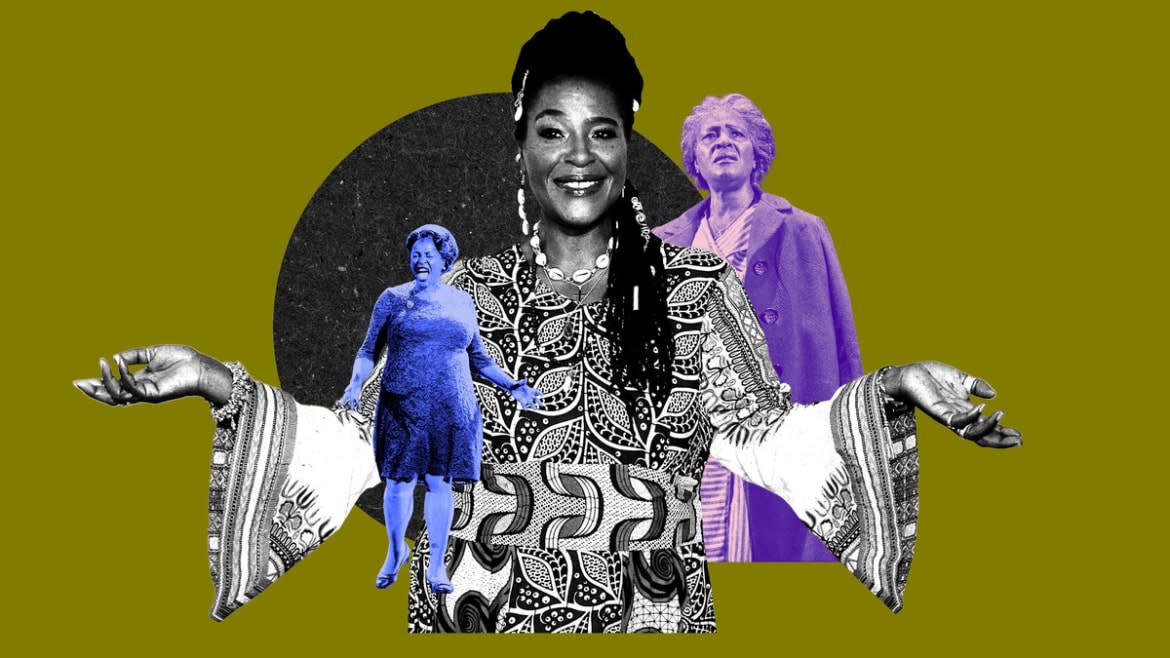
- Oops!Something went wrong.Please try again later.
- Oops!Something went wrong.Please try again later.
- Oops!Something went wrong.Please try again later.
Racism can be unspoken and malign, as well as overtly vicious and glaring. Growing up in London in the 1960s and ’70s, Sharon D Clarke recalls her mother going to the butcher’s, “and being given the cheapest, most rubbish cuts of meat. She cooked them up, made them gorgeous, and took them back to the butcher’s so he could try it. That’s how she got better cuts of meat. She would also go to the fruit and veg man, buy mangoes and make mango juice, which again she would bring to him, and so she would get better fruit and vegetables.”
Her beloved and much-missed mother and father, like so many immigrants, Clarke told The Daily Beast, “were making their way out of nowhere, and finding strength and a sense of community, building a community where there was none—and watching my parents, especially my mum, do that was amazing.”
Clarke’s parents came to Britain from Jamaica in the ’50s. It is through her memories of them, and their example as people and parents, that Broadway star Clarke has crafted her resonant, production-anchoring performance as Linda Loman in the Broadway revival of Death of a Salesman (through Jan. 15, 2023), featuring Clarke, Wendell Pierce (Willy), Khris Davis (Biff), and McKinley Belcher III (Happy) as a Black Loman family. Without a word of Miller’s original being changed, the production powerfully shows how race, racism, and prejudice can be seamlessly factored into an American classic.
Sharon D Clarke Shines in ‘Death of a Salesman’ on Broadway
The multi-award-winning Clarke—last on Broadway, again wowing audiences, playing the title role of the Black maid in Caroline, or Change, for which she was Tony-nominated—says her interpretation of Linda is drawn from her mother, and women like her—“these strong matriarchal Black women who kept the family together. That’s what I know I grew up with. My performance, I hope, honors those women, and my mum’s sense of dignity, her strength, her loyalty, and her love. My mum was no doormat. She was fierce, very opinionated. She would let you know how she felt, then once she had said her piece, that was that. She never held a grudge. She was strong, she held it down. If you crossed her, you knew it but she loved you.”
For Clarke, 56, who was appointed in 2017 an MBE (Member of the Order of the British Empire), Arthur Miller clearly lays out “that roadmap” that Linda follows—which is an utterly steadfast devotion to Willy, which overtakes the love she has for her sons. “It’s not that she doesn’t love her sons, it’s more that she knows Willy needs her—not the boys. They are grown men. Her attention must be with this man who is having a mental breakdown.”
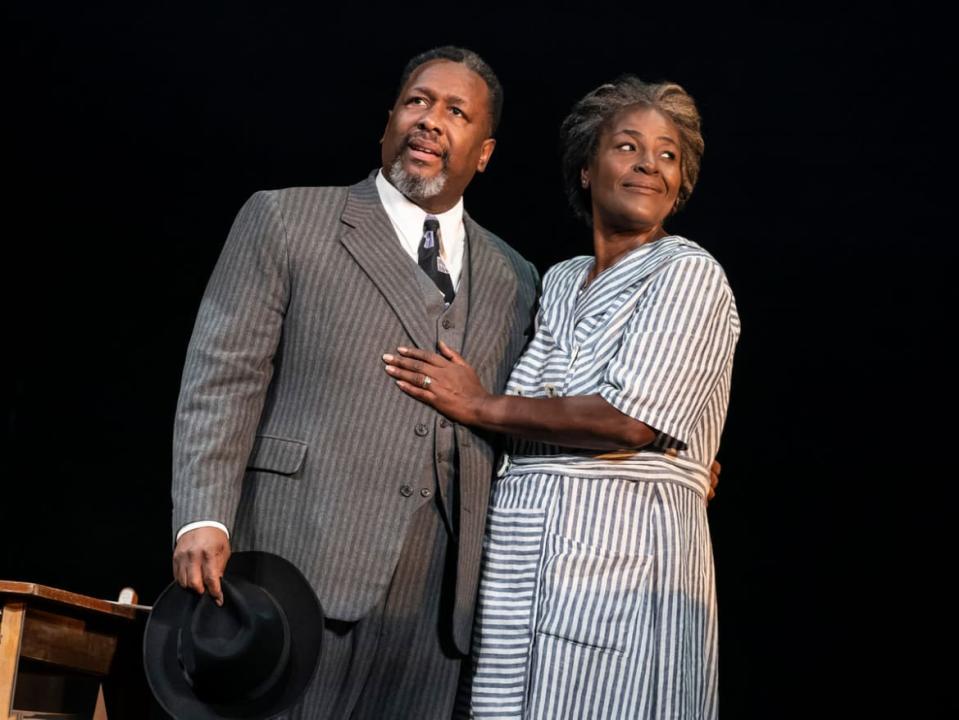
Wendell Pierce and Sharon D Clarke in Death of a Salesman.
It is important to Clarke that we see Willy and Linda as a younger couple, happier and in love, to remind the audience of the good times far away from the now of Willy’s debilitating madness.
Clarke’s own father was a carpenter who worked away from home a lot. “My mum carried the house. Also, my parents were the first members of the family to come to Britain, so most of their relations came through our house before they had their own spaces. I grew up seeing how women operated. They were strong women. And when they came to Britain, this was a time of people proudly putting up signs like, ‘No Blacks, No Irish.’ They were having to make a way.”
Prejudice was everywhere. Clarke’s mother told her of a woman who asked her what it was like to live in a house after living in a cave. (Clarke’s mother showed the woman of the family’s home in Jamaica with a verandah, and never spoke to her again.)
Her parents were targeted by the National Front and racist skinheads. “I learnt about racism very early on. I remember, aged about 6, walking down the street with my mum and dad, a middle-aged white guy calling me a ‘Little fat Black bastard.’ It was the time when my parents had ‘the talk’ with me, like a lot of Black parents have with their children. Every child of color I know has had to have ‘the talk.’ They said society was going to view me in a different way. I would have to work harder, and be ten times as good in something to even be considered equal. When we did Caroline (set in Louisiana in 1963), the parents of the young Black boys playing my kids were having ‘the talk’ with them.”
Both shows helped reveal to Clarke “how not much had changed. That’s really hard, especially after going through both the civil rights movement and Black Lives Matter—when we are supposed to have had this raising of consciousness again. It doesn’t feel like much has shifted. We see this Black family for whom chasing the American dream is futile, because society isn’t ready for someone like Willy, who has invested in that society and who has done what it takes to attain equality—to go for the house and garden, and who has seen how hard that is. But they have been able to make their way, and build a legacy for their kids.”
Clarke imagines a black Willy partaking in the Black economy of the time, using the Green Book to find out where it was safe to stay as a traveling salesman, and being a conduit for products to sell within the Black communities of that time. We also see the vicious racism of the time in the dismissiveness of his awful boss. “The play unpacks it all,” said Clarke, pausing to reflect on the present day. “We’ve still got work to do today, people, we’ve still got work to do.”
“It’s a great start, but it’s still only a start”
Clarke says she and Pierce had wanted to make it clear that their Willy and Linda loved each other, “because in the past Linda can seem a little ‘doormat-y,’” said Clarke. “I wondered why is she with this man, what is it that holds them together? If we can’t see that love, then it doesn’t make sense to me. And we wanted audiences to see an example of Black love on stage. The only place for me to draw on that, luckily enough, is my own parents—mum washing up dishes, dad coming in, slipping his arms around her waist.
“They were so tactile with each other. They would watch TV entwined in each other. I wanted people coming to Death of a Salesman to see that. From that love, we can see where she is floundering. ‘How do I help him? How do I support him?’ Wendell is phenomenal in the role. It’s easy to love him, it’s not a hard journey for me. He’s generous, loving, very funny. He makes me laugh all the time.”
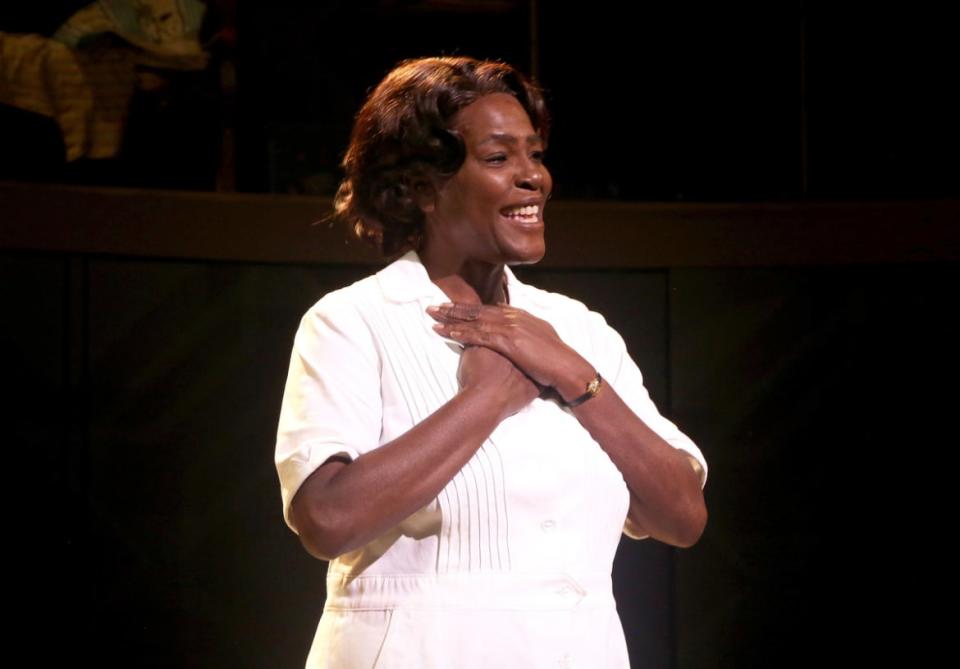
Sharon D Clarke during the opening night curtain call for The Roundabout Theater Company’s production of Caroline, or Change.
Clarke hasn’t read the (glowing) reviews of her performance as Linda. It also isn’t hard to leave Linda behind. “The hard part for me is sorting myself out for curtain call because she’s in floods of tears. I just want to be able to cry that out of my system. If I had my way, I would have a good 10-minute cry after that scene, and I’d be fine. So, I am backstage drying myself off, slapping myself ready for curtain call. But otherwise, I’m able to leave her. I’m quite good like that, putting them down, especially after doing Caroline. You don’t want to carry those things home.” She chats to her dresser and wig person and sees people for drinks afterward.
It was even harder with Caroline, who was on stage most of the performance. “She was never off stage. I was in a state of tension. She held that rage. I felt constantly in that state. That’s Wendell’s job this time. He has to carry that weight. I get a chance to come off stage, and play Linda as a younger, more carefree and aspirational woman. That juxtaposition makes Linda easier to play than Caroline.”
Of Broadway and theater’s wider racial reckoning, post-George Floyd’s murder, Clarke said, “I think it has been a great start, but it’s still only a start. We can’t get to the stage where we think, ‘We’ve got this now.’ Conversations still have to be had. We’re still in the talking phase. A lot of change has to happen on a wider basis.”
A true test of meaningful equality and parity, Clarke said, would be to not simply give Black artists the opportunity to work, but support them so not every production and person has the expectation placed on them to be a success.
“Of course, we strive for excellence,” Clarke told The Daily Beast. “But for a long time, other people have been allowed to try and fail, and try again. With us, there is this sense of ‘We’ll try this with you, and it has to be right.’ We don’t have a chance to fail. Everything needs to be excellent immediately. We need the same support, and space to try things out, as others have had. That is true diversity, inclusivity, and equality. The thing I am afraid of is that something fails and the attitude is, ‘We tried this, now let’s go back to what we know because we know that works.’ If that happens, and the chances are taken away, then it’s all just lip service.”
“We have created some kind of longevity and community”
Clarke learned tap and ballet as a little girl. Her mother, a seamstress, sang “with the most glorious voice,” and had won awards for it. She was Clarke’s first singing teacher. Clarke’s father drove her to every dance class and show she was in. “My parents were very supportive. They never told me to get a proper job. They only said, ‘The business you want to enter is quite precarious, so we want to make sure you have a good education behind you and have another choice of career if this doesn’t work out for you.’”
Clarke trained in social work, and just as she was awaiting her final qualifications, got her first acting job at London’s Battersea Arts Centre. She sang in the group Nomad, starred in well-known British TV shows, and became s stage star in We Will Rock You, winning her first Olivier Award nomination for her role in 1995 in the musical Once on This Island.
Things have improved since that year’s Olivier Awards, when—as Clarke recalled to the Guardian—she and Adrian Lester were the only Black actors in attendance.
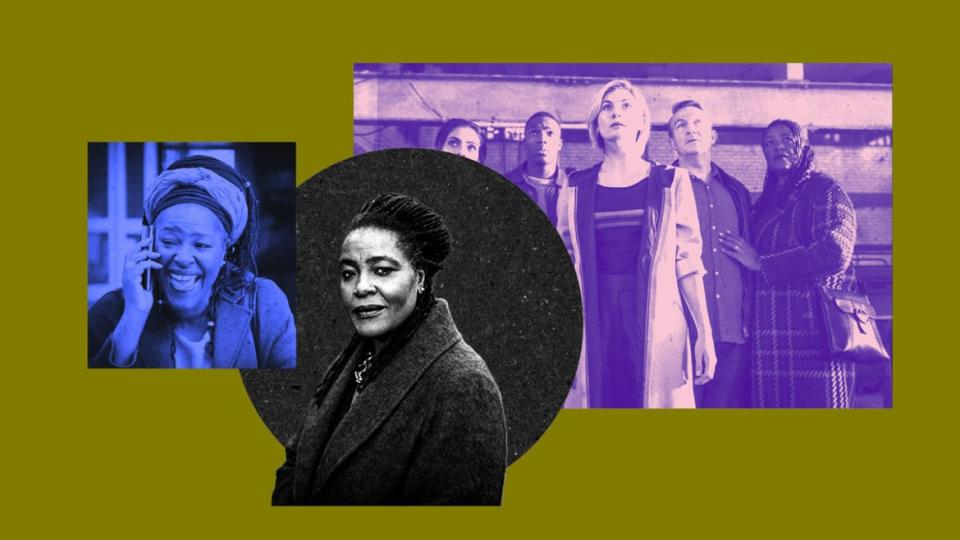
Clarke has been a mainstay in British TV shows such as, from left, Holby City, Informers, and Dr. Who.
“I am still working, and so are my peers, and that is due to the legacy of actors like Mona Hammond, Carmen Munroe, Norman Beaton, and Yvonne Brewster and all those who came before us, who handed the baton on to us, who championed and supported us. The fact that we have lost Mona now (Hammond died in July, aged 91) is so sad; she was such a trailblazer and a support and source of wisdom. Black actors have now made a mark in Britain, and built a community, so people like me have batons themselves to pass on to people.
“It’s not been without worries and tribulations, but we have created some kind of longevity and community, and I’m very proud to do that. Some of us had to leave Britain to have careers, like Marianne Jean-Baptiste—one of Britain’s best actresses and the first Black British actress nominated for an Oscar; Lennie James, Eamonn Walker, even Idris (Elba) had to come here to do The Wire before he went back to the U.K. to do Luther. I was luckier. I also did musical theater. Part of my career was taking singing off my CV, so people would see me as an actor.”
Still, Clarke had to navigate racial stereotyping. “If I was put up for another nurse role I was going to pull someone’s teeth out. We still have to find our way through that. I’m proud of where we have come to, but not saying we can rest on our laurels.”
Clarke came out publicly as lesbian after coming out to her parents. “Once I was out to my parents and family, it didn’t matter. When I told the truth to my family I didn’t care what anyone else thought out in the world.” She married her wife, the director and actor Susie McKenna, in 2008 on stage at the Hackney Empire theatre in East London, where McKenna had many years before directed her in a production of Cinderella.
“I’m a very out and loud and proud actor, but that’s not all I am. But if someone can look at someone like me, without formal acting training, but who has been able to make a career, buy a home, put food on the table, and live life how I have, unashamedly being who I am—if that enables someone else to say, ‘I can take my journey, be true to myself, and succeed’—that’s my job done.”
McKenna was in New York for Clarke’s first week here, then returned to London to perform in her own show. Much of their time, thanks to their stage lives, is “ships in the night,” so lockdown was an “untold joy” of spending time together, dancing around the kitchen, and taking lovely long walks together. When not on stage in Death of a Salesman, Clarke loves wandering in Central Park, going out to eat (“I’m a big foodie”), and never feels lonely, as she has built “a home and community here.”
“The universe has been championing me”
Clarke’s dream role “goes back a long time” to when she was a teenager listening to the radio when she went to bed. “During the night, Jennifer Holliday singing ‘And I Am Telling You I’m Not Going’ from Dreamgirls wafted into my sleep. I was desperate to play Effie in Dreamgirls.”
Clarke auditioned for the role when the musical was set to come to London, “but my voice is low. I can visit high, but it’s not somewhere I can live.”
Another actor, “the right person for the job” at the time, got the role. Then the production didn’t happen. “Imagine how much more gutted I would have been if I had gotten the role and it did not happen. It taught me, as my mum said, ‘What is for you is for you, and won’t be taken away from you.’ Now I’m too old to play Effie.” (Come on, clever musical people, octaves are surely made to be played with!)
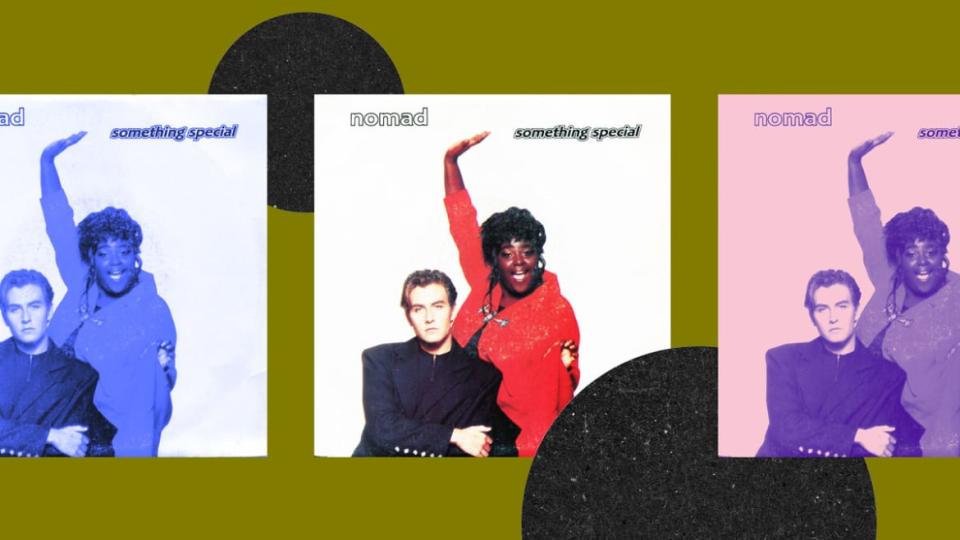
Clarke was a member of house duo Nomad, who released their album Something Special in 1991.
Clarke says she is not an “über-ambitious person, who had to do this role by the time I’m 30, and this one by 40. I go for things that draw me to them. My wife is very political. I express my politics through the shows I do, which hold a mirror up to society. I’m happy keeping on as long as the universe keeps bringing me stuff, and raining down blessings on me. The universe has been championing me. I’m happy to say, ‘Keep it coming.’ I didn’t think I would be back on Broadway within the year after Caroline. It’s amazing, and something I couldn’t have even wished for.”
“If have one big dream,” Clarke said, smiling, “if I could do an album with Quincy Jones, I would be made up. Susie and I went to see him in London. I was riveted. He has such expertise, artistry, and craftsmanship. He’s wonderful.”
The shadow of the pandemic, COVID variants, and box office nerves continues to hang over Broadway and the West End. “These are the times we are in. That’s what it is,” Clarke says. “We were hoping to extend with Caroline, then Omicron hit. Like Linda, we’re living day to day with these shows. All we can do is keep trying and pushing. It’s hard, especially when things like A Strange Loop close, which win accolades and are so well-received. We all have to keep trying and supporting each other. We need audiences. We can’t do what we do without them.”
After Death of a Salesman, some young men have said they relate to the situation facing Biff; one man who came to see Caroline was so moved, he said he had changed his career to one around social justice issues. “If we can affect changes in people’s lives through theater, that’s why we do theater, and why we need audiences.”
There is already Tony Awards buzz around Clarke’s portrayal of Linda in Death of a Salesman. Accolades are a “wonderful thing,” said Clarke. “I asked to be successful, to be respected by my peers, and to have good work. Not Hollywood, not a million pounds. For me, being successful is that I keep working and being a jobbing actor who has a job. That, luckily enough, is working out for me. When you get respect from your peers, it’s like, ‘We see you, we see what you’re doing, and we like what you’re doing. Keep on doing it, and here is some recognition.’ That’s not for me to poo-poo. Some people talk about not accepting the MBE. But all I heard was my mum and dad in my ear saying, ‘Take it!’ It’s recognition for them as well.”
Her father died in 1995, in time to have seen Clarke in Once on This Island and her first Olivier Award nomination. Her mother died in 2016.
“What was lovely was that she was able to see me win my first Olivier [for her role in James Baldwin’s The Amen Caller in 2014]. That was so glorious,” Clarke told The Daily Beast. “The MBE is for all their support, hard work, and everything they invested to enable me to get to this point—and to stand strong and tall in who I am and where I have come from, and what that can mean to others following on behind me.”
Get the Daily Beast's biggest scoops and scandals delivered right to your inbox. Sign up now.
Stay informed and gain unlimited access to the Daily Beast's unmatched reporting. Subscribe now.

